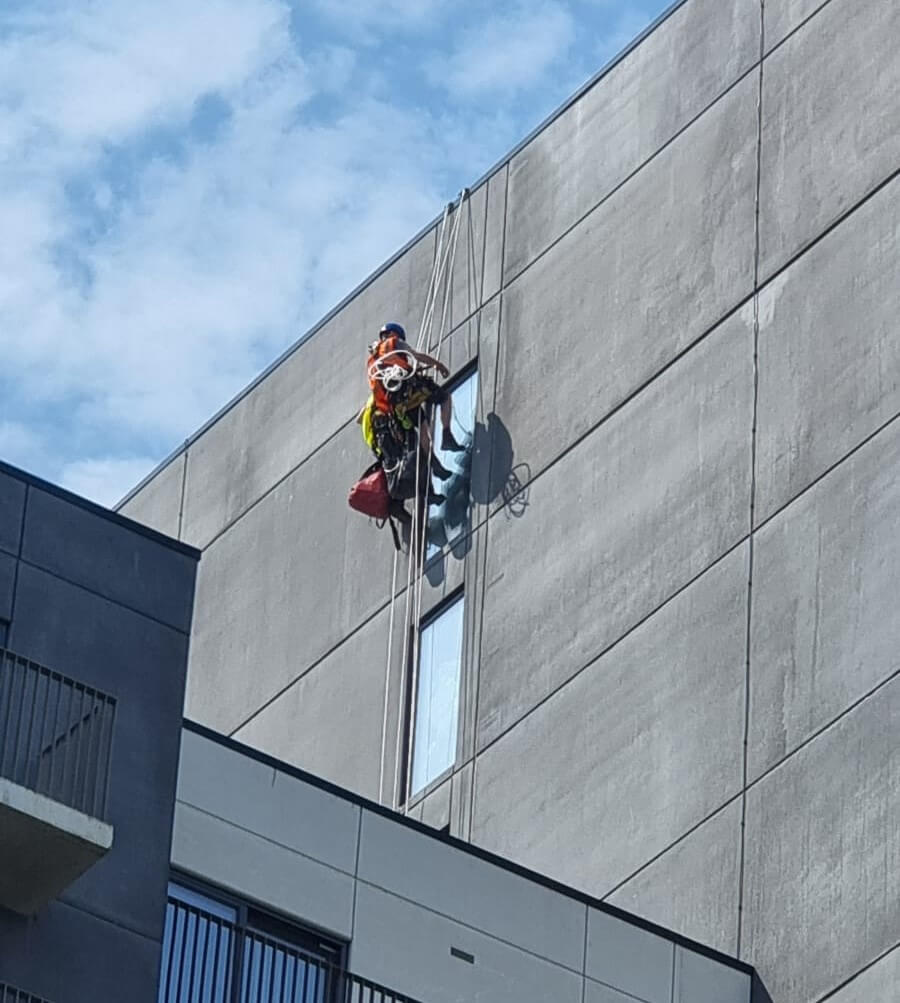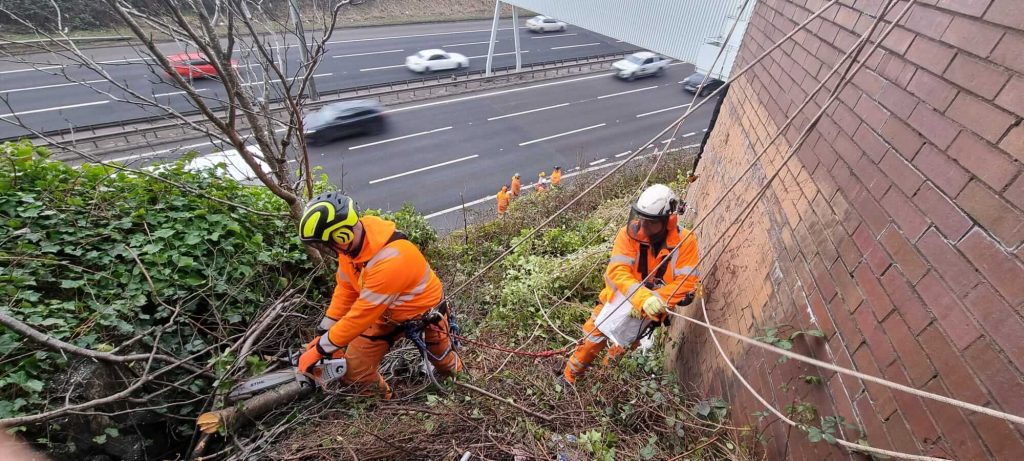Email. [email protected]
Ever wonder who handles those high-altitude inspections or intricate industrial repairs that seem almost impossible to reach? The answer often lies with a rope access technician, a specialist whose job involves tackling the most challenging and precarious tasks. If you’re curious about how to become a rope access technician in the UK or exploring rope access jobs, this is where the adventure begins. Dive into this article to discover what it takes to excel in this thrilling field and why rope access technicians are indispensable in today’s world.
Rope access technicians are like modern explorers, skilled in navigating places that others can’t easily reach, whether they’re scaling skyscrapers or descending into industrial depths, they handle tasks that scaffolding or cradles simply can’t reach. Working with just a sturdy rope to support them, they rely on precision and confidence, trusting their gear and training as they navigate extreme environments. To become a rope access technician, they first master techniques from caving, climbing, and abseiling. This specialized training transforms those skills into an art form. As a result, they make the impossible look routine, whether inspecting, repairing, or cleaning. For these technicians, even the most challenging heights and depths become just another part of their day.
If you’re exploring how to become a rope access technician in the UK or looking for rope access jobs, this career path promises both challenge and opportunity. Rope access technicians use a unique mix of skills to tackle their demanding jobs with flair and precision. They’ve got rope techniques down to a science, handling knots and rigging like pros while staying strong, flexible, and steady in tough spots. Their knack for problem-solving helps them navigate tricky environments, and their sharp eye for detail ensures every task is done right. Did you know that rope access can be up to 50% more cost-effective than traditional scaffolding? It’s no wonder it’s a go-to choice for many projects.
Safety always comes first for these professionals. They master protocols for risk assessment and rescue procedures, ensuring they’re ready for anything. Clear communication with their team is crucial, especially in high-risk situations. They thrive under pressure, keeping calm in stressful environments and adapting swiftly to whatever comes their way, turning even the most daunting tasks into just another successful day on the ropes.

Rope access technicians typically work around 40 to 50 hours a week, but their schedules can vary based on the project and its location. They often start early, work late, or even put in hours on weekends, especially for urgent tasks or tight deadlines. Additionally, they might need to work longer or irregular hours to deal with tricky weather or unexpected challenges. Flexibility is essential in this role, as technicians must adapt their schedules and adjust their plans on the fly while ensuring safety and efficiency remain top priorities.
If you’re wondering how to get into rope access work, starting with the right qualifications is crucial. Having a construction background can definitely give you a head start as a rope access technician, though it’s not a strict requirement. Since the role often involves performing tasks like welding, joining, and electrical repairs while suspended high above the ground, having hands-on experience beforehand is incredibly beneficial.
To excel in this field, you’ll need to combine formal certifications with practical experience. Securing a credential from esteemed organizations like IRATA or SPRAT will showcase your expertise. In addition, you’ll need thorough safety training, including first aid and emergency response. Staying in top physical condition, mastering rope equipment, and sharpening your communication skills will help you tackle the unique challenges of this dynamic and adventurous career.
The duration of a rope access course varies depending on the certification level and the training provider. A basic level 1 course typically lasts between 3 to 5 days, while more advanced levels, such as level 2 and 3, generally require an extra 5 to 10 days each. In total, achieving full certification can take several weeks to a couple of months, factoring in both the training and the required practical experience.

Rope access certification progresses through three key levels, each building on the skills acquired in the previous stage. Technicians start with Level 1, where they learn essential techniques and safety procedures. Moving on to Level 2, they tackle advanced rigging and work independently. At Level 3, they master complex operations, lead teams, and manage rescue scenarios. This structured approach ensures technicians are well-prepared to handle a variety of challenges in their field.
To get IRATA certification, start by completing the challenging Industrial Rope Access Trade Association (IRATA) international training course. This thorough program will teach you the skills needed to work safely and effectively at heights. After finishing the course, you’ll need to rack up practical experience, at least 1,000 hours for Level 1, with additional hours required for higher levels. Next, you’ll tackle both practical and theoretical exams.
The certification process involves three levels, each requiring documented work hours to advance. Once you’ve met all these requirements and submitted your application, IRATA will review your credentials. If everything checks out, you’ll receive your certification. Keep in mind, you’ll need to renew it periodically through refresher courses and assessments to stay current.

A Level 1 rope access technician starts with a five-day IRATA training course that covers the basics, including manoeuvres, rescue techniques, equipment inspection, and safety procedures. Throughout the course, a Level 3 technician keeps a close eye on you to ensure you’re working safely. At this beginner level, you’ll focus on mastering these foundational skills while working under supervision. As you get hands-on experience, you’ll assist with various tasks and build a solid foundation for advancing to more complex roles and higher certification levels.
A Level 2 rope access technician builds on the skills gained from Level 1 and tackles more advanced tasks. To achieve Level 2 IRATA certification, you must complete one year of experience and log 1,000 hours on ropes, proving your expertise in rope management and ascent. The 5-day course dives into advanced rigging, rescue techniques, and the management of complex rope systems.
Additionally, you will supervise Level 1 technicians, ensuring they follow safety protocols. A Level 3 technician will oversee your progress throughout the course, and you’ll also receive further training on safety practices and regulations. This experience prepares you for more responsibilities and sets you up for pursuing Level 3 certification.
Level 3 IRATA certification is the top tier of rope access training and allows you to become an instructor. Before you can enroll in this advanced course, you need to log an extra 1,000 hours of hands-on experience.
Once you complete the training, you’ll gain expertise in relevant legislation, advanced rescue techniques, and strict health and safety practices. In this role, you’ll supervise and train Level 1 and Level 2 technicians, ensuring they adhere to safety protocols. You’ll also need solid first aid training to meet workplace safety standards. This certification prepares you to handle complex rigging, manage high-risk operations, and effectively lead and mentor others in the field.
The key differences between IRATA Level 1 and Level 2 certifications are in task complexity and responsibilities. Level 1 technicians focus on basic skills, such as using ropes and performing routine tasks under supervision. In contrast, Level 2 technicians handle more advanced techniques, like complex rigging and working independently, while also supervising Level 1 technicians to ensure safety standards are met. Essentially, Level 1 covers foundational skills, while Level 2 involves more challenging operations and leadership duties.
Absolutely, rope access technicians are hot commodities in a range of industries. Their unique skills are indispensable for handling tasks in tricky, hard-to-reach spots like soaring skyscrapers, sprawling bridges, and intricate industrial setups. As businesses in construction, maintenance, and inspection search for smarter, more economical solutions, they increasingly rely on these skilled professionals. Plus, with technology advancing and structures becoming ever more complex, the demand for these experts is only set to rise.
In the UK, rope access technicians can expect to earn between £25,000 and £40,000 annually. However, this figure isn’t set in stone, it varies depending on experience, job complexity, and location. For instance, those with advanced skills or working in high-demand fields such as oil and gas, construction, or telecommunications might earn more. Essentially, the role offers attractive pay, especially given the specialized skills and rigorous safety training required. As demand grows and projects become more complex, these figures could rise, making rope access a rewarding career choice for those willing to climb the ranks.
Rope access technicians combine exceptional skill and courage to handle tasks in challenging environments, from towering skyscrapers to intricate industrial setups. Their expertise ensures safety and efficiency in the most demanding conditions. Whether you’re dreaming of scaling new career heights or need top-notch rope access services, reach out to us now and let’s make the impossible possible together!
WE OFFER FREE ESTIMATES AND ALWAYS QUOTE THE BEST POSSIBLE PRICE